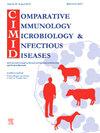高致病性禽流感病毒感染 2.2.1.2 支系(H5N1)和 2.3.4.4b 支系(H5N8)在商品肉鸡中的实验感染
IF 2
3区 农林科学
Q4 IMMUNOLOGY
Comparative Immunology Microbiology and Infectious Diseases
Pub Date : 2024-09-14
DOI:10.1016/j.cimid.2024.102229
引用次数: 0
摘要
本研究评估了 H5N1 高致病性禽流感(HPAI)2.2.1.2 支系和 H5N8 高致病性禽流感(HPAI)2.3.4.4b 支系病毒在商品肉鸡中第 24 天和第 31 天的致病性、传染性和传播性。在第 24 天或第 31 天,两种挑战病毒和接触禽类的死亡率均为 100%,这证实了两种支系(2.2.1.2/2.3.4.4b)在商品肉鸡中的高致病性。两个支系(H5N8 支系 2.3.4.4b/ H5N1 支系 2.2.1.2 病毒)都能在商品肉鸡体内有效复制并在商品肉鸡之间传播。感染 H5N8 病毒的家禽口咽部和泄殖腔排出高滴度病毒,这与 AIV-H5N8 在商品肉鸡中的野外传播有关。两个感染支系的平均病变评分相似,这证实了两个支系在商品肉鸡器官(主要是脾脏、小脑、胸腺、法氏囊和肺)的致病性,也证实了病毒的神经亲和性。在中枢神经系统中,非化脓性脑炎常见于大脑半球的多灶性坏死区、强海绵状病变、神经细胞色素溶解和胶质细胞病变。在大脑中,Purkinje 神经元的色溶解是常见现象。肺部常见间质性肺炎,包括毛细血管细胞(巨噬细胞和淋巴细胞)中度至重度增多,以及与病毒剧烈复制有关的灶性坏死区。在淋巴组织(包括脾脏、胸腺和法氏囊)中,单核细胞出现不同程度的多灶性坏死/凋亡。特别是在脾脏中出现了弥漫性坏死区。在肝脏中,我们发现了肝窦轻度扩张的灶性坏死区。总之,无论是 H5N1 还是 H5N8 型禽流感病毒都具有神经系统亲和力,并在淋巴组织坏死和凋亡的基础上产生免疫抑制效应。本文章由计算机程序翻译,如有差异,请以英文原文为准。
Experimental infection of Clades 2.2.1.2 (H5N1) and 2.3.4.4b (H5N8) of highly pathogenic avian influenza virus infection in commercial broilers
In this study the pathogenicity, infectivity, and transmissibility of H5N1 highly pathogenic avian influenza (HPAI) clade 2.2.1.2 and H5N8 HPAI clade 2.3.4.4b viruses were evaluated in commercial broilers on days 24 and 31. The mortality rate was 100 % in both challenge viruses and in contact birds either on day 24 or day 31 which confirmed the highly pathogenicity of both clades (2.2.1.2/ 2.3.4.4b) in commercial broilers. Both clades (H5N8 clade 2.3.4.4b/ H5N1 clade 2.2.1.2 viruses) were efficiently replicate within and transmitted between commercial broilers. The H5N8-infected birds shed high titer of viruses from oropharynx and cloaca, which associated with the field spread of AIV-H5N8 in commercial broilers. Mean lesion score in both challenged clades showed similar scores, which confirmed the pathogenicity of both clades in commercial broilers’ organs (mainly spleen, cerebellum, thymus, Bursa, Lung) which confirm the neurogenic affinity of the virus. In the central nervous system, non-suppurative encephalitis consisting in multifocal areas of necrosis in cerebral hemispheres, intense spongiosis, neuronal chromatolysis and gliosis were commonly observed. In cerebrum, chromatolysis of Purkinje neurons was a common finding. In the lung, interstitial pneumonia consisting of moderate to severe increase of the cellularity (macrophages and lymphoid cells) in air capillaries and focal areas of necrosis associated with intense viral replication was commonly observed. In lymphoid tissues, including spleen, thymus, and bursa of Fabricius, multifocal areas of necrosis/apoptosis of variable intensity in mononuclear cells were present. Particularly, diffuse necrotic areas were present in the spleen. In the liver, we detected focal areas of necrosis with mild distention of hepatic sinusoids. To conclude the AIV either H5N1 or H5N8 have neurological affinity with immune suppression effect based on necrosis and apoptosis of lymphoid tissues.
求助全文
通过发布文献求助,成功后即可免费获取论文全文。
去求助
来源期刊
CiteScore
4.60
自引率
0.00%
发文量
102
审稿时长
40 days
期刊介绍:
Comparative Immunology, Microbiology & Infectious Diseases aims to respond to the concept of "One Medicine" and to provide a venue for scientific exchange. Based on the concept of "Comparative Medicine" interdisciplinary cooperation between specialists in human and animal medicine is of mutual interest and benefit. Therefore, there is need to combine the respective interest of physicians, veterinarians and other health professionals for comparative studies relevant to either human or animal medicine .
The journal is open to subjects of common interest related to the immunology, immunopathology, microbiology, parasitology and epidemiology of human and animal infectious diseases, especially zoonotic infections, and animal models of human infectious diseases. The role of environmental factors in disease emergence is emphasized. CIMID is mainly focusing on applied veterinary and human medicine rather than on fundamental experimental research.

 求助内容:
求助内容: 应助结果提醒方式:
应助结果提醒方式:


